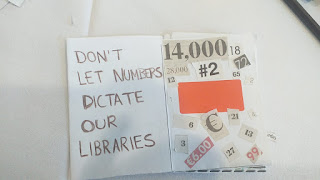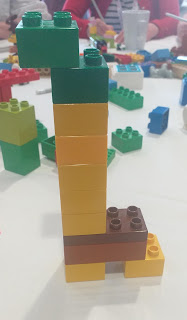Guest post by
Mairéad Mc Keown (BAHDipLIS), Capability & Knowledge Manager at Bord Bia - The Irish Food Board.
Recently I dialled into LinkedIn Learning's Live Office Hours session on How to Make Strategic Thinking a Habit and it was a fantastic time investment. Why? Because at this session Columbia Business Professor
Dorie Clark shared her tips and strategies to help make strategic thinking a daily habit, so that you can make the best use of your time, energy and effort at work.
In this libfocus blogpost I will summarise 11 tips shared by Dorie, so that Library and Information professionals can build their knowledge of how to make strategic thinking a sustainable habit, in the most time efficient way possible.
1. Time:
Strategic thinking is not just something that senior library leaders do, it is in fact something everybody should be doing no matter what level you are at in your career. So what exactly is strategic thinking? According to Dorie, the quick back of the envelope definition for strategic thinking is asking the question "what is it I can do today that makes tomorrow easier and better?" So, if you can slow down and answer that, that’s being strategic. The good news is it doesn’t require a huge amount of time per se, it’s about reframing the way you see the world.
Now what? To kick start this habit it’s important to assess where you are right now. Complete Dorie’s
Free Long Game Strategic Thinking Self-Assessment so you can benchmark where you are starting from. Then begin to include short buffers between meetings/library instructions so you can remain focused, get tasks completed and reflect. Also set aside 30 minutes on a Friday afternoon to further develop your strategic thinking habit. The bottom line is this, to develop the habit you need to be strategic with your time.
2. Alignment:
The things you’re doing today represent what you’re focusing on and what you’re focusing on cycles up to who you are as a person.
Dorie recommends creating three lists:
- To Focus list = a big picture reminder of why you’re doing the things you’re doing
- To Be list = a reminder of what you’re striving for in the world and who you want to be as a person
- To Do list = the things you’re doing today
Now what? Once you create these lists it’s important to take the time to reflect and ensure they align.
3. Execution:
There are two things that get in the way of strategic thinking execution:
- Tip of the iceberg – things you can see, too many emails, too many meetings
- What’s underneath the iceberg - Busyness which has become a form of status and is often used for emotional avoidance. For instance, when we don’t know how to do a thing or when we are in emotional pain.
4. Decision diary:
In most of life you can control the process of strategic thinking and not the outcome. Therefore, you should analyse past mistakes and importantly past successful decisions because it’s useful to analyse the process and ultimately this helps make your strategic thinking sharper over time.
Now what? Treat your decisions as learning opportunities. Keep a decision diary, record the rationale behind successful decisions and mistakes and take the time to learn from past decisions that you’ve made.
5. CAN framework:
Using the CAN framework to think about strategic decisions, can help eliminate a lot of wrong strategy. CAN is an acronym which stands for:
- Clear – am I clear about what I should spend my time and energy on today?
- Align - is the thing I’m doing today aligning with the long term goals that me, my team and my university/institution/agency/company has identified?
- New information – have circumstances changed since I put the plan that I’m following into place – is there new information that needs to be considered?
Now what? Use the CAN framework to get Clarity on goals, Alignment on your previously mentioned lists, New information on macro forces. Then re-orientate yourself to shift from short term to long term thinking.
6. Inspiration files:
Re-orientate yourself in that way, so that instead of just reacting and responding to things, you are proactively making choices to try to see things on the horizon. Planning in advance, and asking what is it that I can do now that can make it easier to get to that place tomorrow, helps switch the paradigm from short term to long term thinking.
Now what? Leverage your libraries’ collections/other library collections and quality sources to create an inspiration file on topics to inspire and help you reach future goals.
7. Multiple strategies:
When evaluating multiple strategies, the more upfront research you can do the better. It’s really useful to ask questions like – has anyone else been in this situation before and if so what did they do, and how did it work? And use that research to reverse engineer and to begin to see patterns that can help you make smarter choices about which approaches are more or less practical for you. Also figuring out what’s the smallest bet you can place, can allow you to test multiple strategies. This prevents you from wasting time and money on something half baked.
Now what? Lean into
the LAI and its specific groups,
libfocus,
An Leabharlann and other good sources of insight and information in the Library and Information field. Use them to learn from the practice of others who have been in similar situations and carry out upfront research that can help answer relevant strategic questions. Also consider documenting and sharing your strategic activities with other Library and Information professionals so you can reciprocally share your practice for the benefit of the wider community. In addition, you could consider placing small bets to test multiple strategies to test and learn fast.
8. Goals:
The one most important thing a strategist should consider when making a strategy is the progression from the tactics and the techniques to the strategy, to the goal. What’s always important is to make sure that your strategy is in service of particular goals and to know what the goal is. Then it’s going to depend on the external circumstances and your analysis of that and there’s not probably one strategy that’s always the right one. It’s about putting out your feelers and understanding in a given moment what is right for that moment.
Now what? Make sure your strategy is in service of particular goals and understand what’s right in the moment. How it was before is not going to be how it is forever, the world is constantly changing, so developing current awareness is critically important.
9. Roadblocks:
The longer the goal the more room there is for unexpected annoying things to happen, like roadblocks. So make sure with the scoping upfront you devote enough time to research and conversations that ensure you’re less likely to be rattled when something unexpected happens. There are many ways to achieve a goal, it’s also important not to get wedded to just one idea.
Now what? Use this set of checklist questions to guide your strategic thinking upfront and leverage a reference librarian to help you find answers: What did it take for other people to achieve this goal? How long did it take them? What path did they follow? What did that look like?
10. Questions:
Library and Information professionals can encourage their directors/leaders/managers to be more strategic by periodically asking the right questions that foster a strategic thinking culture.
Now what? Practice asking your leaders the following strategic thinking questions:
- Great I understand you want me to do x, y, z can you tell me more about the higher level objectives these tasks will help us achieve?
- Can you paint a picture for me of a year from now, where do you want to see our department and what does success look like?
- If we were able to win at one/two/three big things, what are the most important things for us to win at so that we can accomplish the goals that we want? Where’s the biggest leverage?
11. Shiny object syndrome:
Shiny object syndrome is essentially looking around and having FOMO (Fear Of Missing Out) about what others are doing. But necessary strategic intervention is not about what others are doing it’s about whether market conditions have changed and weighing up do we need to change as a result of that. That’s the real question.
There wasn’t a market condition that necessitated Google plus and it’s now defunct. In contrast, taxi apps answered a need for better connections between consumers and taxi drivers and they digitally transformed that industry.
Now what? Start asking, am I looking at a change in technology, laws or government regulations or socio political morays that make something different? If yes then it’s probably worth a change in strategy, not just they’re doing that, so I should too.
Implications for Library & Information Professionals who want to build a sustainable strategic thinking habit:
Then leverage your new knowledge from the assessment and begin putting the 11 tips shared in this blogpost into practice.
Repeat the free strategic thinking assessment annually to track your progress and reflect on your journey to becoming a strategic thinker.
References and further reading on Dorie’s Strategic Thinking content:
Clark, D. (2021, October 26). The Long Game: How to Be a Long-Term Thinker in a Short-Term World. Next Big Idea Club. https://nextbigideaclub.com/magazine/long-game-long-term-thinker-short-term-world-bookbite/30275/amp/
Clark, D. (2021). Dorie Clark: The real reason you feel so busy (and what to do about it) | TED Talk. Www.ted.com. https://www.ted.com/talks/dorie_clark_the_real_reason_you_feel_so_busy_and_what_to_do_about_it
Clark, D. (2023, July 19). How To Make Strategic Thinking a Habit - With Dorie Clark | LinkedIn. Www.linkedin.com. https://www.linkedin.com/events/7084213438507311104
Clark, D. (2023b, November 7). How to make strategic thinking a habit. LinkedIn Learning | Login. Www.linkedin.com.
Clark, D. (2023c, November 7). Strategic Thinking. LinkedIn Learning | Login. Www.linkedin.com.












